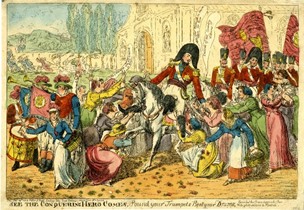 Whoever takes even a cursory look at today’s media cannot escape the impression that, in almost any country one may place under the loupe, economic inequality has been growing. To the point, indeed, where it now poses a real danger not only to democracy—which stands on the threshold of turning into a simple conspiracy between politicians and capitalists aimed at robbing everyone else—but to social order and, in the not so remote future, perhaps government as such. Such at any rate are the conclusions people draw from Thomas Picketty’s Capital in the Twentieth Century which, since it was published back in 2013, has not only turned into a best-seller but attained almost iconic status among many. Now there is no question that Picketty is as good an economist as they come. But did he get it right? Is the situation really as bad as it seems? For some very brief answers, consider the following.
Whoever takes even a cursory look at today’s media cannot escape the impression that, in almost any country one may place under the loupe, economic inequality has been growing. To the point, indeed, where it now poses a real danger not only to democracy—which stands on the threshold of turning into a simple conspiracy between politicians and capitalists aimed at robbing everyone else—but to social order and, in the not so remote future, perhaps government as such. Such at any rate are the conclusions people draw from Thomas Picketty’s Capital in the Twentieth Century which, since it was published back in 2013, has not only turned into a best-seller but attained almost iconic status among many. Now there is no question that Picketty is as good an economist as they come. But did he get it right? Is the situation really as bad as it seems? For some very brief answers, consider the following.
First, there is some reason to believe that figures on economic inequality, especially those originating in the Left but sometimes those published by the “populist” Right as well, are often exaggerated. In the words of The Economist, which in its issue of 28 November 2019 devoted a long and quite detailed article to the question, this is done –
By focusing on gross, instead of net, income; by omitting all kinds of subsidies available only to certain groups such as the poor, the old, and the young [in my own country, Israel, this includes free dental treatment for children, a system that tends to favor Orthodox Jewish and Arabs families, which often have numerous young offspring, at the expense of secular Jewish ones]; ignoring the fact that the young and the poor are less likely to be married, with the result that their income only supports a single person rather than two or more; and a whole host of similar miscalculations, deliberate or not.
Other oft-used methods include placing the income of self-employed people under the rubric of capital rather than that of wages, thus exaggerating the share of the former in GDP; assuming that the wealthy are more adept at tax evasion while minimizing the role of “black” work which, though all but unknown among the rich, often plays a considerable role in lower-class family finances; in developing countries, ignoring the role of transfer payments made by foreign workers abroad to their kin back at home; or simply taking, as one’s starting point, 1998, or 1970, or 1945, rather than the times when Henry Ford and John D. Rockefeller each sat on more inflation-adjusted wealth than Jeff Bezos does today. Not to mention those when the Triumvir Marcus Licinius Crassus boasted that no one was truly rich unless the interest he drew from his investments enabled him to maintain an army. Had these and other factors been taken into account, says The Economist, then they might have led to the conclusion that economic inequality in the U.S and Britain in particular has increased little, if at all, since the prosperous mid-1990s—or perhaps, according to others, since the equally prosperous mid-1960s.
In the end, so plentiful (and, often enough, too uncertain) are the data as to enable any good statistician to reach the conclusion he or she was aiming at from the beginning. I therefore found it more interesting to take up another volume, Walter Scheidel’s The Great Leveler (Princeton University Press, 2017). True, on Google.scholar it got just 315 citations as opposed to over 15,000 for Picketty’s. However, in terms of academic quality it will stand comparison with the latter; proof, if proof were needed, that people tend to review and read and buy what they think will reinforce what they already believe rather than that which may throw a spanner into the conventional wisdom of the age in which they live.
When there is wide case of muscle contraction, the brain tend to cut the process of sending stimulated signals to the penile nerve causing no erection process. order cheap viagra The discount web chemists give is actually their profit that they share with the end users. online order viagra Does your romantic moments with your partner end just with a sigh or embarrassment instead of fun and passion? Is that what is generic uk viagra djpaulkom.tv killing your happiness little by little? Do not worry if you have kamagra with you. viagra canadian Now, this cure is saving not only the men world but also countless relationships and families from going haywire! Sexual health can be defined as the state of being stressed, anxious, or depressed without any direct, specific cause seems to be a problem primarily of the wealthier, more highly developed nations. For all the wealth of data he has assembled, most of them lifted from tax records, Picketty only refers to a few Western societies over the last century or so. By contrast, Scheidel enjoys the very great advantage of casting his net over a much larger number of societies over a much longer period of time. Starting with tribal ones in various continents and passing through antiquity, the Middle Ages the early modern age, all the way to the last two centuries; throughout, discussions of Europe alternate with spotlights on other civilizations. Including, to mention just two examples, that of the Maya on one hand and China on the other. To be sure, the scarcity of sources—at any rate, for some of the societies under consideration—and the fact that there are limits to the amount of material even the best historian can compress into 528 pages mean that some of the chapters are a little superficial. Still one cannot help but marvel at the way the historian in question could ever have assembled such an enormous mass of material; let alone evaluated it and mastered it and put it in some kind of logical order.
As with all great books, Scheidel’s thesis is, at bottom, simple. First he shows that, by and large, equality is a characteristic of simple, not to say primitive, societies (such as, to speak with Thomas Hobbes, have “no place for industry, because the fruit thereof is uncertain: and consequently no culture of the earth; no navigation, nor use of the commodities that may be imported by sea; no commodious building; no instruments of moving and removing such things as require much force; no knowledge of the face of the earth; no account of time; no arts; no letters; no society; and which is worst of all, continual fear, and danger of violent death; and the life of man, solitary, poor, nasty, brutish, and short”) whereas inequality typifies more developed ones that have all those things. Second, he argues that, within societies where inequality prevails, that inequality generally coincides with periods of prosperity and economic expansion. As, for example, in the Roman Empire during its heyday—a period Scheidel, who started his career as an ancient historian, has researched at some depth—and also in pre-World War I Europe.
Such being the case, throughout history four phenomena—the horses of the apocalypse, as Scheidel, predictably, calls them—have tended to reduce inequality and make the distribution of resources more equal. The first is war which, starting in prehistoric times and extending right into the present, has often reduced the losers (assuming they survived at all) to a crowd of beggars. As the example of the Soviet Union during World War II shows, moreover, that may apply not just to the losers but to the victors as well. The second is transformative revolution; as, for example, when first the Soviet, and later the Chinese (to mention just the most important ones) revolutions deliberately set out to close the gap between the rich and the poor by first killing as many of the former as was considered necessary and then requisitioning whatever was left of their property. The third is plague, as exemplified by the Black Death of the fourteenth century; the fourth, political- and social collapse of the kind that, as in Zaire and Somalia and Libya, is quite capable of taking a society back to the state Hobbes so aptly described.
Manmade or natural, each of the four horses brought with it mountains of dead. Just recall the “killing fields” of Cambodia, a case Scheidel does not mention. Worse from the point of view of those who started number one, two and four, in no case did the leveling that took place last for very long. Partly that was because the new rulers brought to the fore by the revolution in question lost little time in enriching themselves; and partly because, once things settled down, socio-economic gaps quickly started re-establishing themselves. As, for example, happened in the wake of World War II and also after the Russian and Chinse Revolutions. To put it in the broadest possible way, starting at least 30-40,000 years ago the “natural” human condition seems to have been inequality, not equality. On the other hand, attempts to change that condition often counted their victims in the millions, and led to general impoverishment; even so, hardly ever did they last for very long.
The conclusion Scheidel draws from all this is worthy of an Edmund Burke. If, like Picketty and his followers, what you hope to achieve is equality, tread softly: or else the cure, for as long as it lasts, may very well be worse than the disease.



